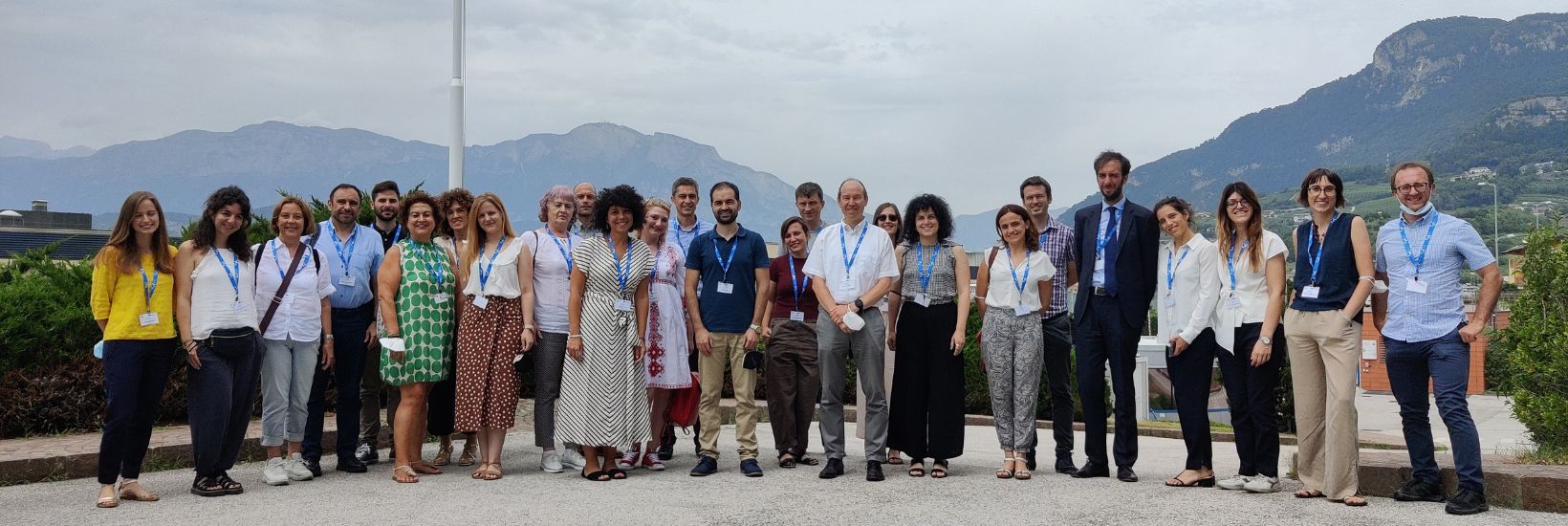On 28 and 29 June 2022, 16 partners from 8 different countries met (both in person and virtually) for the official launch of the new Horizon Europe NEVERMORE project.
The project, in which ALDA is a partner, is determined to support excellence in research on climate science and climate policy. The focus is on the modeling theory in order to take a significant step forward to overcome the current silo approach* in favour of an integrated assessment one for evaluating impacts, risks and interactions of climate change across sectors; as well as adaptation and mitigation strategies towards a climate neutral and resilience society, relying on the multiple feedbacks that occur between the variables involved in climate change.
During these two days of intense work in Trento at the headquarters of the Bruno Kessler Foundation, leader of the project, the partners discussed future steps to be taken and exchanged their project ideas and vision.
More specifically, ALDA, in particular, will be responsible for developing an effective project communication and dissemination strategy. The latter will also include the creation and engagement of five local and one transnational Stakeholder Councils that will be the meeting point between the project and society. Thus, the above-mentioned Councils are going to involve all those actors who are concretely involved within climate change and the related policies.
NEVERMORE: supporting excellence in research on climate science and climate policy
During the meeting, the NEVERMORE project partners presented their actions for the next 4 years and the geographical areas of the 5 case studies that will be followed throughout this period.
- Sitia, Crete Island (EL), a place that thrives on agriculture and tourism and where the main problems are: the rise of the sea level; flooding and droughts; the necessity to preserve biodiversity; and the food chain & archaeology.
- The Trentino region (IT), a mountainous region whose main policy areas are tourism (mainly winter) and energy and where the most important challenges to be addressed lie in the rising temperature, unpredictable precipitation patterns, and modified seasonal climate dynamics.
- The Boreal region of Västerbotten and Norrbotten Counties (SE), region characterised by energy production, tourism and reindeer herding, and which is now witnessing an increase in temperature, causing unpredictable precipitation patterns, while modifying seasonal climate dynamics.
- Murcia region (ES), a Mediterranean region with a socio-economic context characterised by agriculture, tourism and industry that is witnessing desertification due to soil erosion in agricultural systems, and required a more sustainable water management system.
- The wetland in the Danube Delta (RO) where agriculture, low levels of education, and economic dependence are the overall framework of the area. Hence, there is a need to protect the environment and ethnic wealth, promote sustainable tourism and eco-agriculture, and better land management.
Overall, these two days have proven to be a successful beginning, and a good synergy was born, paving the way for the next 4 years of the project.
Stay tuned and follow NEVERMORE’s social pages: TWITTER| INSTAGRAM| YOUTUBE|
***
NEVERMORE Horizon Eu project includes the follows in the partners:
- AUSTRIA: The Centre for Social Innovation (ZSI);
- FRANCE: The European Association for Local Democracy (ALDA);
- GERMANY: Potsdam Institute for Climate Impact Research (PIK);
- GREECE: National Centre for Scientific Research “Demokritos” (NCSRD), Municipality of Sita;
- ITALY: Bruno Kessler Foundation (FBK), Rina Consulting Spa, Euro-Mediterranean Centre on Climate Change (CMCC), Autonomous Province of Trento (PAT);
- ROMANIA: Software Imagination & Vision SRL(SIMAVI), Tulcea County Prefecture;
- SPAIN: CARTIF Technology Centre, University of Valladolid (UVa), Development Institute of the Region of Murcia(INFO Murcia);
- SWEDEN:Swedish Environmental Research Institute (IVL), Energikontor Norr- North Sweden Energy Agency.
***
